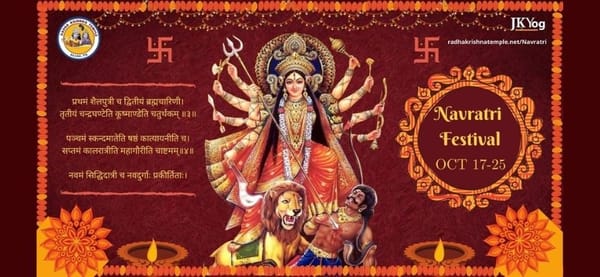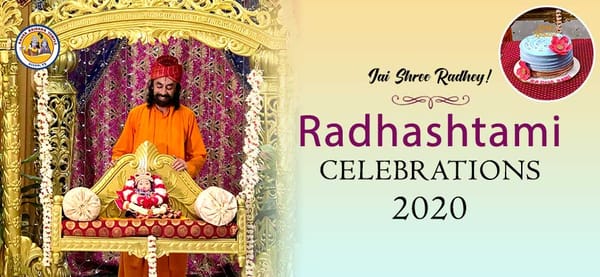Translation of Lecture by Shree Maharajji
Everyone knows that worldly attainments are transient, and that God is the only reality. When a death occurs, we say, “Ram Naam Satya Hai (The only reality is the name of God).” So, when we know that the world cannot give us happiness, then to make material demands from God is in-discrimination. Let us understand why it is wrong to askGod for worldly things.

First, we must love God, only then do we have a basis of asking Him for anything at all. Even in the world, we ask only from those people whom we love and with whom we have a relationship, not from just anyone and everyone. It would be a joke to ask God for something when we have no love for Him. Therefore, we should not make this mistake as long as we still love the world.
There is an incident about Ramakrishna Paramhans. He developed throat cancer. Everyone knew that the Saint’s death was imminent. He was famous in Kolkata and all over Bengal as a Saint who had transformed many lives. So, people went to him and said, “You have attained perfection. To rid yourself of cancer is child’s play for you. Just ask God to cure you, and your cancer will disappear.” Ramakrishna Paramhans replied strictly, “Should I divert my mind from God to worrying about cancer? And how can I ask God to do such dirty work for me? I have loved God only with the desire to serve Him. I cannot engage in such pettiness and ask for His help just for the sake of this wretched body. Moreover, even if I am cured, I will still have to leave my body at the appointed time.
Whether it is a sage, an ascetic, a yogi, a Saint or even God, everyone has to leave the world at the appointed time. The world may say that so-and-so died of heart attack, or cancer, but the fact is that his time to die had arrived. Even God does not stay a moment longer than the scheduled period of His descension. Then how can anyone else stay beyond his appointed time? You may have heard of an incident in Ayodhya in this context. Yamraj came to Lord Ram to tell Him that the period of His descension was over. When Yamraj comes to God and the Saints, he places his head at their feet and says, “I have come to inform you that the period of Your descension is complete. You may choose to stay or leave. I am merely fulfilling my duty.” He cannot force them to leave as he does for others. Yet, the supremely independent Ram did not stay a moment longer than His planned 11,000 years. At the exact time, to the second, He left the world. And this is true for every descension of God, and every Saint, whether it be Tulsidas, Surdas, Meera,orKabir. Seeing that even God, who is the lawmaker Himself, does not violate this rule, then why should the Saints, who are His servants break the law?
When we say we do not wish to die, it can be for two possible reasons. One reason is that we are too attached to the world-to wealth, home, father, mother, wife, son-and still wish to enjoy them, and so do not wish to leave. On the other hand, elevated aspirants have a sensible reason for not wanting to die. They think, “I have not attained God as yet. If I had some more time I could achieve my goal.” They want more time, just like students who become very happy when given a few extra days to study for exams. But, God and Saints have nothing to attain. They leave at the appropriate time, without any reluctance.
So, Ramakrishna Paramhans said, “Everyone has to leave at the scheduled time. I have no objection to this hole in my throat. This body has nine holes anyway-the eyes, nose, ears, mouth, etc. So what if there is one more! It would be very wrong to bother the Divine Mother over it.” Thus, asking God for worldly favours is the greatest folly. This should not be done even after becoming a devotee. It is said in Bhagavat:
yatpṛithvyāṁ vṛīhiyavaṁ hiraṇyaṁ paśhavaḥ striyaḥ
nālamekasya paryāpt tasmāttṛiṣhṇāṁ parityajet
“Even if one is given the wealth of infinite universes, his desires, cravings and longings will not reduce in the least.”
tṛiṣhṇā tu taruṇāyate (Hitopadesh)
“When you try to satisfy desires, they grow stronger.” Thus, worldly opulence, no matter how great, cannot provide true happiness. So, it is foolish to desire worldly objects. But, to ask for them from God is even greater foolishness. Devotion, which is practiced with the aim of attainment of material desires, has many dangers. Firstly, it is clear that, the devotee is not yet sure where true happiness lies-in the world, or in God? If it is in the world, then what is the need of God? If it is in God, then what is the need for this world? If our goal is to attain happiness, then going to God, who is the source of unlimited bliss and asking Him for the world, which is a source of misery, evidently implies that we still have hopes of getting unlimited happiness from the world. When our goal itself is not right, then how can we practice devotion?
In the material realm, ninety-nine percent of the people desire worldly things. These desires are often fulfilled by their own prarabdh (destiny). When material possessions are acquired by people according to their destiny, they misunderstand it as the blessing or Grace of God. When people pray to God and wish for a material thing, if that desire is fulfilled, people think that it was due to the blessing they received from God. And, when they do not receive these possessions due to their destiny, they start cursing or criticizing God, and even think it as a sign of God’s anger. This is dangerous as it has a harmful effect. A person will be a believer as long as he acquires worldly possessions, and when the material desires are not fulfilled, this faith in God immediately disappears and he can even become an atheist.
Not even God can grant a person worldly gains, if it is not destined for him. Whatever worldly happiness is destined for each person is given to him according to his fate. The results of past actions are awarded in the present life. In Ramayan, the Almighty Lord Ram could not save His father Dashrath. In Mahabharat, Abhimanyu’s uncle was God Shree Krishna Himself, his father was the great Saint, Arjun, and the person who conducted his marriage was God Ved Vyas. Yet, they could not save him from being killed in the battle. Then how can God change the destiny of an ordinary person?
Lastly, lack of worldly happiness is actually God’s Grace, because in this state we remember God. Kunti also asked for this wish from God, “O Shree Krishna! Give me sorrow and pain, so that due to the lack of material pleasures, I can chant Your glories.”
God is all-knowing and whatever He does, is for our benefit, then why do we interfere and ask Him for anything? We do not know what is best for us. Therefore, if we always remember that God is Omniscient and leave everything to Him, then the disease of asking will never arise.







